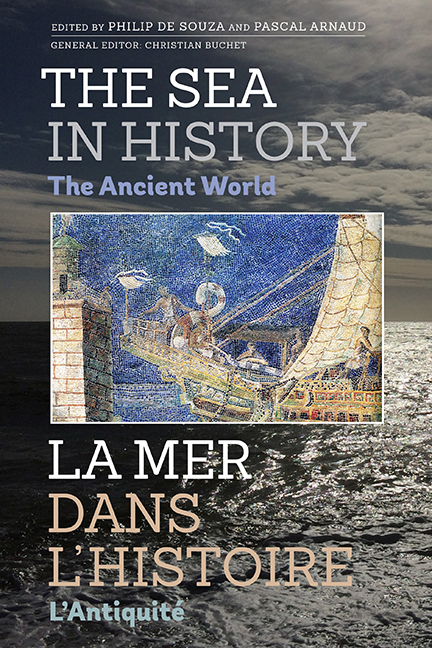Book contents
- Frontmatter
- Contents
- List of Illustrations
- List of Contributors
- Introduction générale et remerciements par Christian Buchet
- General introduction and acknowledgements
- Introduction (français)
- Introduction (English)
- La mer est le propre d'Homo sapiens
- PREHISTORICAL CASE STUDIES
- HISTORIAL CASE STUDIES: The Ancient Near East and Pharaonic Egypt
- HISTORICAL CASE STUDIES: The Mediterranean world
- HISTORICAL CASE STUDIES: The Indian Ocean and the Far East
- L'océan Indien dans l'Antiquité: science, commerce et géopolitique
- Ancient seafaring in Eastern African Indian Ocean waters
- Early China and the Indian Ocean networks
- The mobility of people and ideas on the seas of Ancient India
- Ships, Sailors and Kingdoms of Ancient Southeast Asia
- La violence maritime comme reflet du contexte géopolitique: une piraterie sui generis dans l'Asie du Sud-est des premières cités-entrepôts indianisées
- Conclusion (français)
- Conclusion (English)
- Conclusion générale par Christian Buchet
- General conclusion
- Comprendre le rôle de la mer dans L'histoire pour éclairer notre avenir
- Understanding the role the sea has played in our past in order to shed light on our future!
Ancient seafaring in Eastern African Indian Ocean waters
from HISTORICAL CASE STUDIES: The Indian Ocean and the Far East
Published online by Cambridge University Press: 20 April 2017
- Frontmatter
- Contents
- List of Illustrations
- List of Contributors
- Introduction générale et remerciements par Christian Buchet
- General introduction and acknowledgements
- Introduction (français)
- Introduction (English)
- La mer est le propre d'Homo sapiens
- PREHISTORICAL CASE STUDIES
- HISTORIAL CASE STUDIES: The Ancient Near East and Pharaonic Egypt
- HISTORICAL CASE STUDIES: The Mediterranean world
- HISTORICAL CASE STUDIES: The Indian Ocean and the Far East
- L'océan Indien dans l'Antiquité: science, commerce et géopolitique
- Ancient seafaring in Eastern African Indian Ocean waters
- Early China and the Indian Ocean networks
- The mobility of people and ideas on the seas of Ancient India
- Ships, Sailors and Kingdoms of Ancient Southeast Asia
- La violence maritime comme reflet du contexte géopolitique: une piraterie sui generis dans l'Asie du Sud-est des premières cités-entrepôts indianisées
- Conclusion (français)
- Conclusion (English)
- Conclusion générale par Christian Buchet
- General conclusion
- Comprendre le rôle de la mer dans L'histoire pour éclairer notre avenir
- Understanding the role the sea has played in our past in order to shed light on our future!
Summary
ABSTRACT.This contribution analyses historical texts from the Egyptian and Graeco-Roman worlds, and compares their accounts with the latest archaeological discoveries in East Africa, many made by the author in Tanzania, to assess the extent of seafaring, especially maritime trade, along the East African littoral of the Indian Ocean. It argues that people from the old-world civilizations visited the coastline of East Africa in search of various resources and suggests that East Africans also sailed the Indian Ocean coastline both north and south of Tanzania.
RÉSUMÉ.Cette contribution analyse différents textes historiques des civilisations égyptiennes et gréco-romaines en les comparant avec les découvertes archéologiques récemment faites en Afrique de l'est, en particulier celles de l'auteur en Tanzanie. Elle étudie l'essor de la navigation, en particulier du commerce maritime, le long du littoral est-africain de l'océan Indien, et justifie la visite des civilisations antiques sur cette côte d'Afrique de l'est par leur vraisemblable intérêt pour ses nombreuses ressources. Elle évoque également la possibilité que les Africains de l'est aient navigué tout le long de ce littoral, aussi bien au nord qu'au sud de la Tanzanie.
DEFINING THE ANCIENT PERIOD IN AN EAST AFRICAN CONTEXT
The term ‘ancient’ in this paper means the period of human history when civilizations began, when humans started to have permanent settlements, to write, and to travel long distances, to trade and to communicate with people from other civilizations. It was in this period that seafaring became the main mode of long-distance travel. For western-oriented scholarship the ‘ancient’ period is traditionally defined as the time covering all of the Pharaonic Egyptian civilization, and all of the Classical, or Graeco-Roman world. The early western Asiatic civilizations are also included in this period, which begins about 3000 BC. For the purposes of this chapter the ‘ancient’ period embraces the African Neolithic period, which begins around 3000 BC, and the civilizations of the Early Iron Working (EIW) cultural traditions, lasting, in Sub-Saharan Africa, from about 200 BC to AD 500.
- Type
- Chapter
- Information
- The Sea in History - The Ancient World , pp. 523 - 535Publisher: Boydell & BrewerPrint publication year: 2017
- 1
- Cited by



